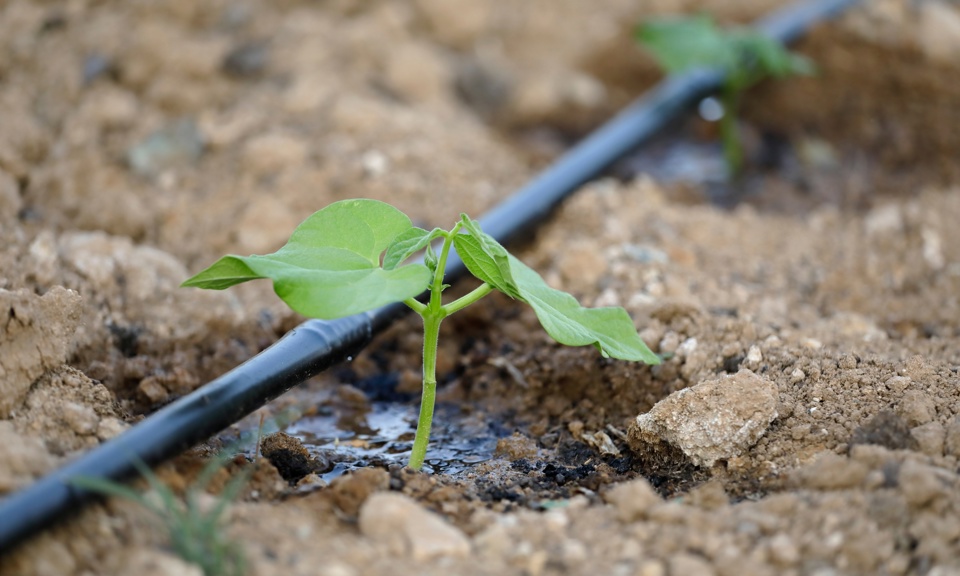Summer surge in HTA’s water resilience campaign

12 August 2025
The vital importance of a long-term water resilience plan was underlined this week as the Horticultural Trades Association (HTA) stepped up its campaign to ensure that water-related issues faced by its members are recognised and addressed by the government.
As part of this work, the HTA’s Chief Executive, Fran Barnes, attended this week’s National Drought Group and wrote to the Environment Secretary and the Minister responsible for water, urging the delivery of a long-term water resilience strategy. The HTA has also published an updated water briefing for its members.
The warm, dry spring may have initially boosted sales but the prolonged hot and dry weather has come with significant consequences to the horticultural industry and highlights an urgent need for action on water resilience, beyond short-term interventions on immediate crises from flooding to drought.
The HTA’s water resilience campaign has so far included:
- Support and guidance for HTA members
- Water restrictions updates
- HTA member water webinar
- New water stakeholder briefing
- Representation at the National Drought Group
- High-level political calls for action
- Hort Week opinion piece
Fran Barnes, Chief Executive of the Horticultural Trades Association (HTA), said:
“No member I’ve spoken to takes water for granted. Yet businesses within the environmental horticulture sector operate within a system that offers little support and presents many barriers to water resilience. Growers who want to invest in their own water storage face complex planning hurdles and many are forced to rely on expensive, treated mains water simply to keep their crops alive. Each summer, misleading 'hosepipe ban' headlines target our sector, confuse customers, dampen plant sales, and damage confidence, just when trade should be thriving.
“I have written to the Environment Secretary, Rt Hon Steve Reed MP, urging him to act on creating a plan for water resilience that supports our members in creating their own water resilience strategies, making it easier for them to invest in reservoirs or new water-saving technologies. We can no longer go from flood to drought. Water resilience is an essential part of UK infrastructure.
“Environmental Horticulture is vitally important to the UK’s climate change mitigation plans, improving biodiversity, helping with urban cooling and flood management, but a lack of water resilience and headlines of ‘hosepipe bans’ rather than wider messages about responsible water use are a missed opportunity that undermines our sector.
“We need strategic change. I have made a clear call to government for a new focus, debate and action on water resilience, unlocking the barriers to water storage and ensuring horticulture experts can be part of a constructive way forward for the UK’s water sector.”
Guy Massey, Production Manager at Rochfords, commented:
“Building our reservoir has been incredibly costly (£140,000) and it’s taken us much longer than it would have if we’d received some support from the government. We want to do the right thing, and luckily, we were able to make the investments but for some businesses it just wouldn’t be viable without support. That needs to change. Doing our bit to store and use water more efficiently, while taking pressure off the water system is essential, especially as droughts become more frequent in the UK.”
Garden centres and ornamental plant growers use about 20 million cubic metres of water each year^, the equivalent of just 0.2% of the UK's total water use. However, messaging around water restrictions – often referred to as hosepipe bans – can have a direct, adverse effect on the sector.
Stuart Tickner, Site Operations Manager at Provender Nurseries, said:
“It is hugely important that the government, local authorities, and the water industry get the messaging on water restrictions right. In May, we were told that a ‘hosepipe ban’ might be introduced in our area. The mere threat of this cost our business £300,000 because of cancelled orders. A hosepipe ban isn’t an accurate description, but it has a massively negative impact on our sector and it feels very targeted towards horticulture. Changing the terminology is a simple, practical ask, but it would make a huge difference.”
The HTA is continuing its water resilience journey with a Sustainability Roadmap, highlighting the need to increase water efficiency in the industry, whilst raising understanding in government of the critical importance of water to ornamental horticulture and landscaping.
Facts and figures^^
- UK garden centres and ornamental growers use around 20 million cubic metres of water a year – that is just 0.2% of the UK's total water use.
- 50% of UK ornamental plant growers use rainwater capture systems, and 32% do not, but would like to.
- 41% of growers use reservoirs to store water, minimising reliance on mains during times of shortage.
- 58% of garden centres use automated watering systems for at least some of their watering, increasing efficiency and reducing workload for staff.
- 74% of the water a garden centre uses is for watering plants, 8% on customer toilets, and 13% on the café/restaurant. The rest is used for other purposes.
^ This includes mains water from all sources (rainwater capture, abstraction, etc)
^^ Source: HTA - Ornamental horticulture water needs and use survey, October 2020
